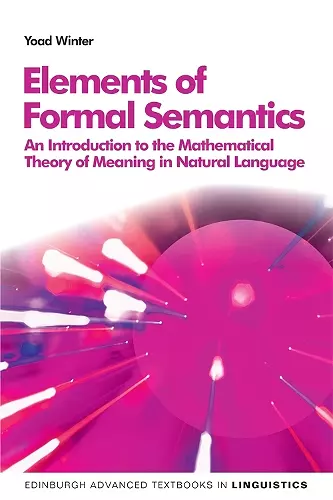Elements of Formal Semantics
An Introduction to the Mathematical Theory of Meaning in Natural Language
Format:Paperback
Publisher:Edinburgh University Press
Published:1st Apr '16
Should be back in stock very soon
This paperback is available in another edition too:
- Hardback£110.00(9780748640447)

This book provides a thorough introduction to formal semantics, blending logical analysis with empirical linguistics to explore meaning in language.
The book Elements of Formal Semantics serves as a concise yet comprehensive introduction to a vibrant area of modern linguistic research. It highlights the beauty and elegance inherent in the mathematical study of meaning. By focusing on the essential principles and techniques of formal semantics, the author provides readers with a foundational understanding of how sentence meaning is constructed from individual word meanings. This exploration emphasizes the importance of structure in language, making it a critical component of semantic analysis.
In Elements of Formal Semantics, the author skillfully synthesizes traditional logical language analysis with contemporary empirical findings, offering innovative perspectives on language meaning. The book is designed to be accessible, making it suitable for students who are beginning to explore the field of formal semantics. With a clear and engaging writing style, it encourages readers to grasp complex concepts with ease.
Additionally, the volume includes practical examples and exercises to reinforce learning. It not only caters to students of linguistics but also has applications in fields such as logic, computational linguistics, and artificial intelligence. Through this engaging approach, Elements of Formal Semantics opens up new avenues for understanding how meaning is constructed and interpreted in language.
Elements of Formal Semantics has several notable assets: it is formally careful and deliberate, as thorough as any logic textbook; it has a lot of varied and well-thought-out exercises (including practice exercises with solutions); a Conclusions chapter containing references on a number of phenomena (adjectives, definiteness, plurality, tense and aspect) students can extend the formal foundation to; and, at the end of each chapter, a Further Reading section that cites innovative, contemporary research articles as well as historical sources and other textbooks. As a result, it is a very versatile book, useful as a primary textbook, as a secondary textbook for more advanced or formally inclined students, or as a source of supplementary formal definitions and exercises. -- Jessica Rett, UCLA * Glossa *
One of the major pros of this book is its wealth of exercises, many of which are supplied with solutions, at the end of each chapter. Some are technical and others are more advanced, and many of these are singled out as introducing new notions not addressed in the text. -- Journal of Logic Language and Information * Kjell Johan Sæbø, University of Oslo *
Winter presents the semantics of language in a manner that practically shows that logic originates in language, and is not just applied to language. Due to this manner of presentation, the current book can be treated as a modern continuation of the book by van Fraassen [Formal Semantics and Logic, 1971]. Therefore, the current book is and will be interesting to students of logic, especially undergraduates in mathematical logic, alongside the students and researchers in linguistics who, probably, were the book's intended audience. -- Ioachim Mihai Drugus * MathSciNet *
An excellent introduction to the subject, both as a textbook and as background reading for students who find themselves exposed to more advanced parts of semantics. I haven’t seen the foundations of formal semantics explained more clearly, more cleanly and more elegantly anywhere before. Professor Hans Kamp, University of Stuttgart -- Professor Hans Kamp
ISBN: 9780748640430
Dimensions: unknown
Weight: unknown
272 pages